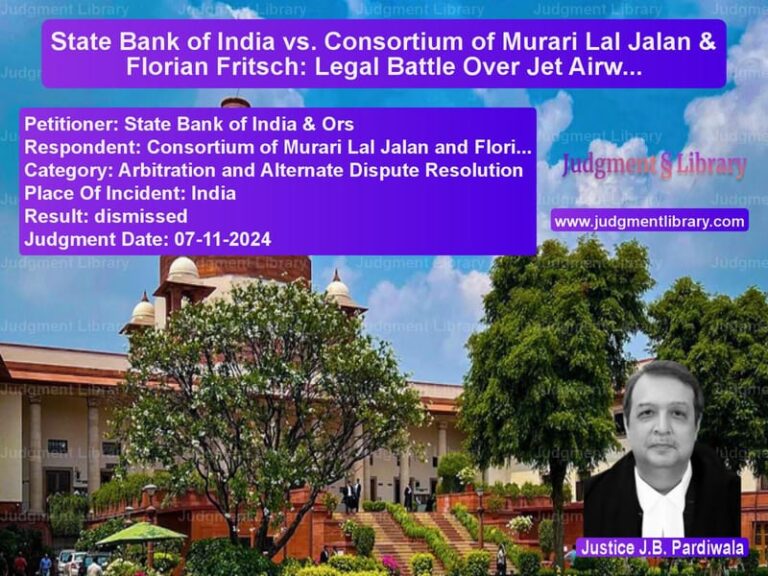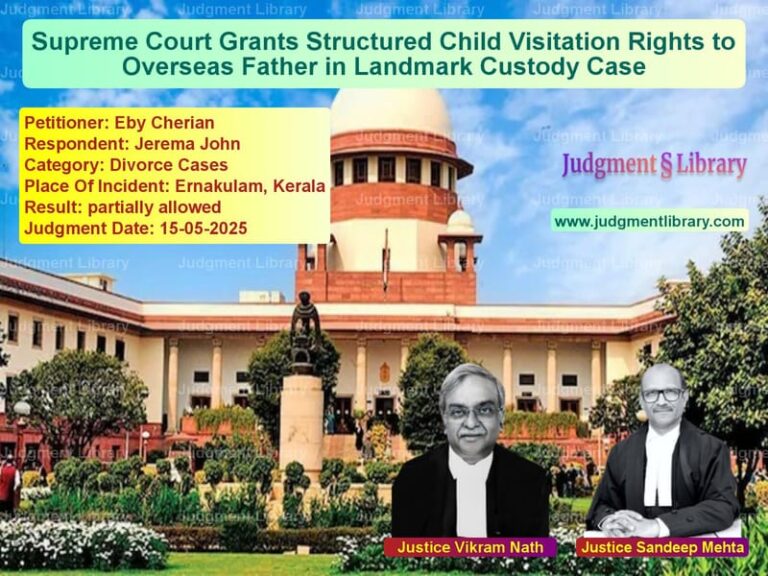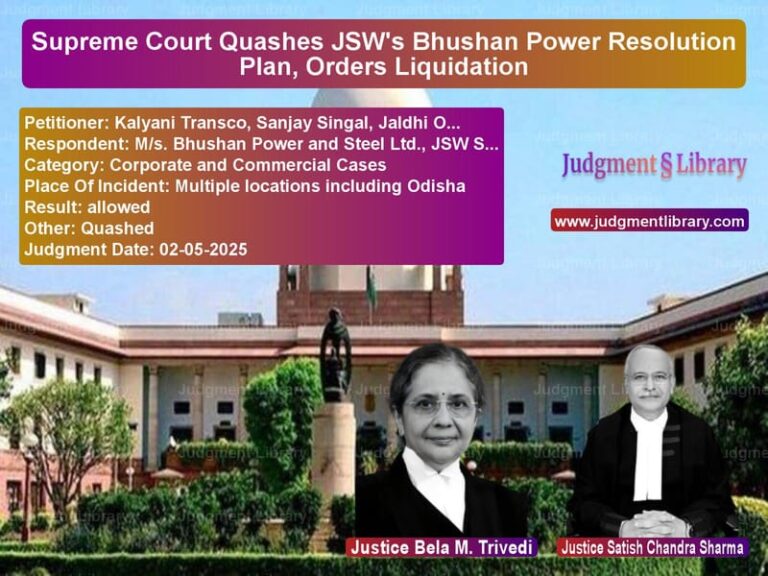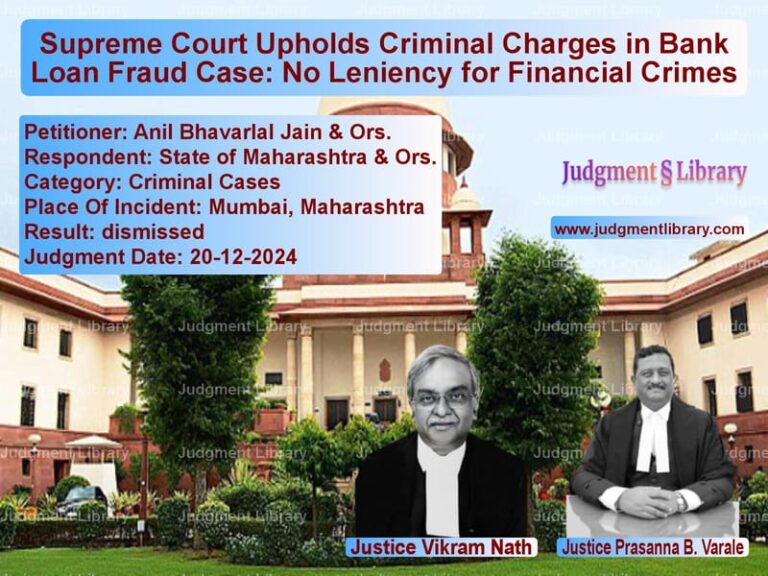Supreme Court Modifies Life Sentence in Kerala Quadruple Murder Case
The Supreme Court of India has modified the life sentence of Navas @ Mulanavas, convicted for the brutal murder of four individuals in Kerala, reducing his imprisonment from 30 years to 25 years without remission. The ruling provides significant clarity on sentencing principles in cases based on circumstantial evidence and reinforces the framework established in Swamy Shraddananda v. State of Karnataka for imposing life imprisonment beyond the usual 14-year term.
Background of the Case
The case arose from a horrifying crime committed on the night of November 3, 2005, in the residence of the deceased Ramachandran. The victims included:
- Ramachandran (45 years old)
- Latha (39 years old, Ramachandran’s wife)
- Chitra (11 years old, their daughter)
- Karthiayani Amma (80 years old, Ramachandran’s mother)
The prosecution alleged that the accused, Navas, had an illicit relationship with Latha, which led to pregnancy and a subsequent termination. When Latha tried to distance herself from him, he harbored resentment. On the night of the crime, he allegedly broke into the house by making a hole in the wall, armed with knives and an iron rod, and killed all four victims before attempting suicide.
Trial and High Court Rulings
The Trial Court found Navas guilty under:
- Section 302 IPC (Murder) – Sentenced to death
- Section 449 IPC (House-trespass) – Five years rigorous imprisonment
- Section 309 IPC (Attempt to commit suicide) – Two months simple imprisonment
The case was referred to the Kerala High Court for confirmation of the death penalty. The High Court of Kerala upheld the conviction but reduced the death sentence to life imprisonment with no remission for 30 years. The modification followed the legal framework established in Swamy Shraddananda v. State of Karnataka (2008), which allows courts to impose a fixed-term life sentence beyond 14 years.
Navas appealed to the Supreme Court, arguing that the evidence was insufficient for conviction and that the 30-year no-remission period was excessive.
Arguments by the Appellant (Navas)
The defense counsel, Mr. Renjith B. Marar, contended that:
- The case relied entirely on circumstantial evidence, which was insufficient to establish guilt beyond a reasonable doubt.
- No direct witnesses linked him to the crime.
- The accused had been in a relationship with Latha and had entered the house on the fateful night at her invitation.
- Upon arrival, he found the family already dead, leading him to attempt suicide in despair.
- His conduct in prison over the past 18 years had been exemplary, warranting a reduction in sentence.
Arguments by the Respondent (State of Kerala)
Senior Advocate Jayanth Muth Raj, representing the State, asserted that:
- The evidence overwhelmingly established the appellant’s guilt.
- Forensic evidence, including fingerprint and handwriting analysis, confirmed his presence at the crime scene.
- The brutality of the crime warranted the harshest possible sentence.
- The High Court had already shown leniency by reducing the death sentence, and further reduction would be unjustified.
Supreme Court’s Observations and Judgment
1. Circumstantial Evidence and Conviction
The Court ruled that the prosecution had established an unbroken chain of circumstantial evidence pointing to the appellant’s guilt. The key elements considered were:
- Presence at the Crime Scene: Witness testimonies confirmed that Navas was inside the house when the police arrived.
- Forensic Evidence: Bloodstains matching the victims were found on his clothes, and a handwriting expert confirmed that messages written on the wall were in his handwriting.
- Forced Entry: A hole made in the wall for entry suggested premeditation.
- Failure to Provide an Alternative Explanation: Under Section 106 of the Indian Evidence Act, Navas had the burden to explain how the murders occurred inside a locked house, which he failed to do.
2. Sentencing Principles
The Court reviewed the sentencing framework established in Swamy Shraddananda, which allows for fixed-term life imprisonment beyond 14 years. It noted:
“While the crime is heinous, the accused has already served 18 years in prison and has demonstrated good conduct. Reducing the 30-year sentence to 25 years without remission serves the interests of justice.”
3. Modification of Sentence
The Supreme Court upheld the conviction but modified the sentence:
- Life imprisonment for 25 years without remission (instead of 30 years).
- Other sentences under Sections 449 and 309 IPC remained unchanged.
Implications of the Judgment
This ruling has several significant implications:
- Clarifies the use of circumstantial evidence: Reinforces that strong circumstantial evidence can sustain a conviction.
- Balances retribution with reform: Reduces the no-remission period while maintaining a serious punishment.
- Affirms sentencing discretion: Courts have the flexibility to impose life imprisonment beyond the standard 14-year term.
- Encourages rehabilitation: Recognizes good conduct in prison as a factor in sentencing.
The decision ensures that the punishment remains proportionate to the crime while allowing for the possibility of reform.
Petitioner Name: Navas @ Mulanavas.Respondent Name: State of Kerala.Judgment By: Justice B.R. Gavai, Justice K.V. Viswanathan, Justice Sandeep Mehta.Place Of Incident: Thrissur, Kerala.Judgment Date: 18-03-2024.
Don’t miss out on the full details! Download the complete judgment in PDF format below and gain valuable insights instantly!
Download Judgment: navas-@-mulanavas-vs-state-of-kerala-supreme-court-of-india-judgment-dated-18-03-2024.pdf
Directly Download Judgment: Directly download this Judgment
See all petitions in Murder Cases
See all petitions in Attempt to Murder Cases
See all petitions in Judgment by B R Gavai
See all petitions in Judgment by K.V. Viswanathan
See all petitions in Judgment by Sandeep Mehta
See all petitions in partially allowed
See all petitions in Modified
See all petitions in supreme court of India judgments March 2024
See all petitions in 2024 judgments
See all posts in Criminal Cases Category
See all allowed petitions in Criminal Cases Category
See all Dismissed petitions in Criminal Cases Category
See all partially allowed petitions in Criminal Cases Category







